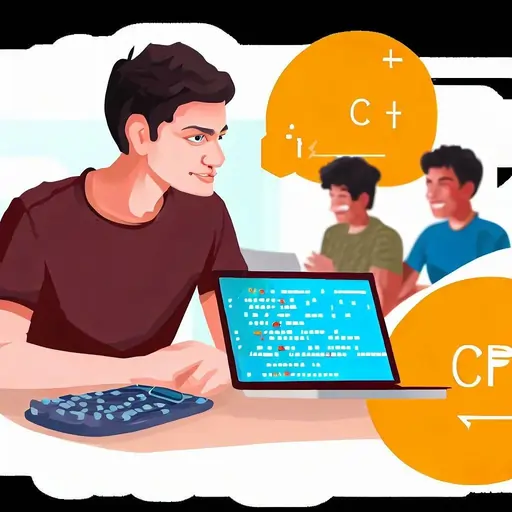
Group CPP (C++) homework projects can be a lively and educational experience. You have the ability to use a team's collective intelligence and creativity as you delve deeper into the world of collaborative coding. You can work on complex coding problems with your peers, come up with creative fixes, and expand your knowledge of C++ programming.
In addition to developing technical proficiency, group CPP homework also fosters vital teamwork abilities. Working together teaches you to embrace different viewpoints, actively listen to others, and communicate your ideas clearly. Peer learning is made possible by collaborative programming because each participant brings a variety of perspectives and methods to the table. It encourages an atmosphere where creativity flourishes, allowing you to go beyond what is possible for you to accomplish alone.
This in-depth guide will cover a variety of topics related to working on group CPP assignments, including creating efficient communication channels, assigning tasks, and resolving conflicts. You can make the most of your team's potential, increase productivity, and produce outstanding results by adhering to these rules.
Whatever the difficulty of your assignment, the guidelines provided in this manual, along with professional C++ Homework Help, will equip you with the skills necessary to solve any CPP problem successfully. Let's explore the world of collaborative coding, where exceptional C++ programming accomplishments are made possible by the synergy of teamwork.
The value of collaboration in programming:
It is imperative to first master the fundamentals of C++ before delving into teamwork and collaboration. Programming language C++ is statically typed, free-form, multi-paradigm, compiled, and general-purpose. It is widely used in the creation of applications and systems, the creation of video games, and even high-performance computing. Getting familiar with C++'s syntax, structure, and some of the most popular libraries and frameworks is necessary for grasping the language's fundamental concepts. Learning the fundamental concepts of programming, such as variables, data types, operators, loops, functions, arrays, strings, and pointers, as well as object-oriented programming ideas like classes and objects, is essential. After you've mastered these fundamentals, you can lead your team in the direction of more challenging projects.
The act of programming is not a solitary endeavor. The best applications are frequently the result of teamwork, where groups of programmers join forces and combine their talents and ideas to produce something truly exceptional. This is especially true for C++ programming, where taking on big projects by yourself can be a huge undertaking. In C++ or any other language for that matter, group projects give you the chance to simulate real-world situations, preparing you for the working world. Students learn the fundamentals of C++ through teamwork, as well as important soft skills like leadership, problem-solving, and communication. Collaborative efforts may result in more effective and original C++ homework answers.
Establishing a Team and Roles and a Collaborative Workplace:
Once the foundation is established, it's time to assemble your team. Putting together the smartest people in a group doesn't guarantee that it will function effectively. It involves assembling a well-balanced team that covers each other's weaknesses and enhances each other's strengths. Every team member should ideally excel in a different area of the C++ language, such as algorithmic reasoning, debugging, writing effective code, comprehending sophisticated libraries, etc.
Role definition follows team formation as the next crucial step. Project manager, lead developer, testing engineer, and debugger are typical roles. The project manager is in charge of scheduling tasks, assigning tasks, and monitoring progress. The software is tested for bugs by a testing engineer, and any problems are resolved by a debugger under the direction of the lead developer. These positions are flexible, though, and can change as the project develops and the needs of the team change.
A group must first establish a collaborative environment in order to work together effectively. This pertains to C++ homework and entails choosing appropriate team-building tools and methodologies that facilitate effective communication, coding, and debugging. For managing various versions of your project and tracking changes, you need a version control system like Git. A platform for storing and sharing your code can be provided by programs like GitHub or Bitbucket. You can write, debug, and test your code using integrated development environments (IDEs), such as Visual Studio or Code::Blocks, which support C++. Project management tools like Trello or Asana can help keep track of tasks and deadlines, while tools for communication and coordination like Slack, Microsoft Teams, or Discord offer channels for real-time communication and discussion.
Creating a Plan for Working on Your C++ Homework:
It's crucial to create a plan for your C++ homework after deciding on the roles and tools. Your project's complexity and nature will determine the best approach. For instance, you might want to use a divide-and-conquer strategy if your project requires you to create a complex application from scratch. This entails segmenting the project into smaller, more manageable tasks and allocating them to various team members in accordance with their areas of expertise and strength. On the other hand, a pair programming approach might be more appropriate if the project is more focused on solving a set of issues. In this scenario, two programmers collaborate on the same issue; one writes the code, the other reviews it and both offer feedback. As it decreases the likelihood of errors and promotes conversation and collaboration, this method can result in more accurate and effective code.
Conflict Resolution, effective communication, and Best Practices in C++:
Communication is crucial in any team. Without clear communication, misunderstandings can result in mistakes, wasted effort, and unneeded conflict. Clear idea expression, attentive listening, constructive criticism, and regular team updates on your progress are all components of good communication. It's also important to know how to handle conflicts or disagreements. It's inevitable that team members won't always agree on everything, so it's critical to establish a constructive method of resolving disagreements, like voting or open discussion.
It takes a little bit more than just fundamental programming knowledge to work on C++ in a team. It's crucial to adhere to best practices to guarantee a smooth workflow and avoid common pitfalls. They consist of, but are not restricted to:
This makes it possible for everyone to comprehend and collaborate on the code written by others. The structure of the code, naming conventions, indentation, and commenting are all examples of the style.
Regular code reviews can help teams catch bugs early and ensure that everyone is aware of the entire codebase. Additionally, it makes learning and sharing best practices among team members easier.
proper library usage Using libraries and frameworks can hasten development and lower the likelihood of mistakes. To prevent potential problems, all team members should be aware of how to use them properly.
By creating unit tests, you can make sure that each part of your program operates as it should. Teams can find and fix bugs before they grow into bigger issues by creating and running these tests.
Good documentation not only makes it easier for others to understand your code but also makes it easier to maintain and debug the software over time.
Conclusion:
Learning to work effectively as part of a team while doing C++ homework not only makes you a better programmer but also prepares you for the future. Working on a real-world software development team requires good teamwork and communication skills, and practicing these skills during your homework can give you a head start. Moreover, by pooling your ideas and skills with your teammates, you can approach problems from multiple angles and come up with creative, efficient solutions.
the ability to collaborate effectively is an invaluable skill, one that can take you far in your career. Whether you're working on C++ homework or a professional project, the principles remain the same: Understand your strengths, know your role, communicate effectively, and be willing to learn and adapt.
Working together on group CPP homework assignments provides a special opportunity for development and education. You can harness the power of teamwork to overcome obstacles and produce remarkable results through effective communication, task delegation, and problem-solving.
Don't forget to create effective communication channels, interact with your team members, and play to each other's strengths. To create a collaborative environment that promotes innovation and creativity embraces open dialogue, and respects various viewpoints.
You can confidently navigate the complexities of group CPP homework by using the strategies described in this manual. Accept the challenges, respect the contributions of your team, and work to improve constantly.
Solving problems while working on group CPP assignments is just one step in a journey of personal and professional development. As you complete CPP assignments as a team, embrace the power of collaboration and let your team's collective brilliance shine.
